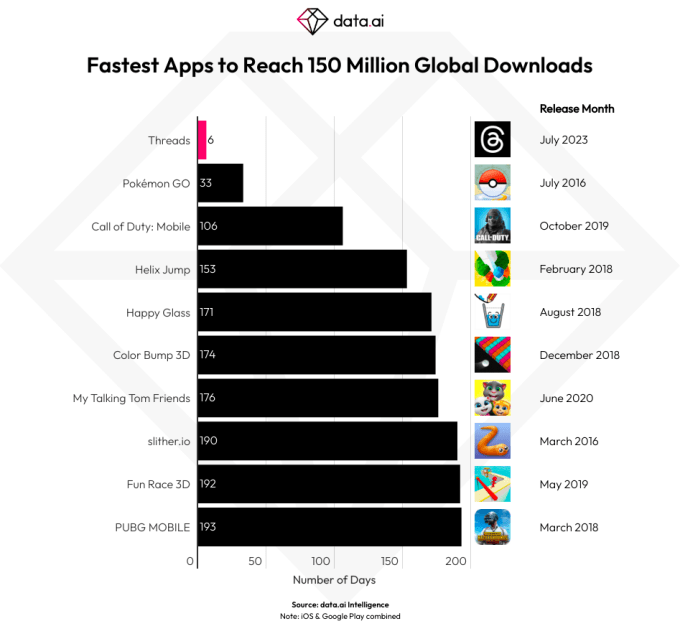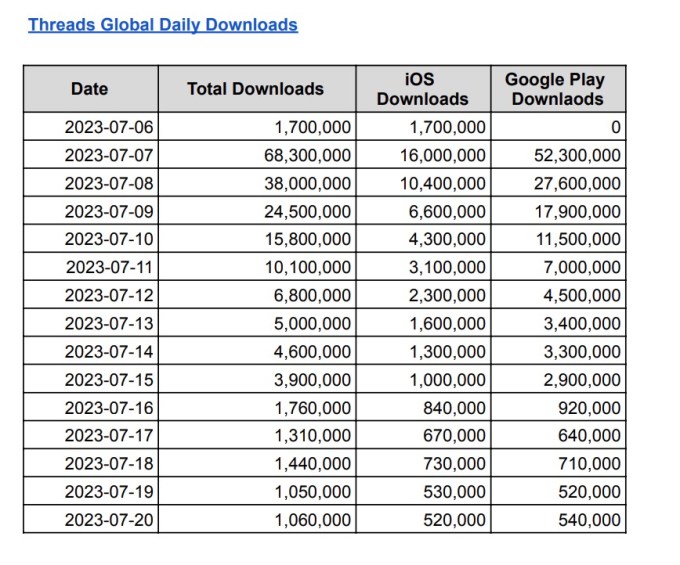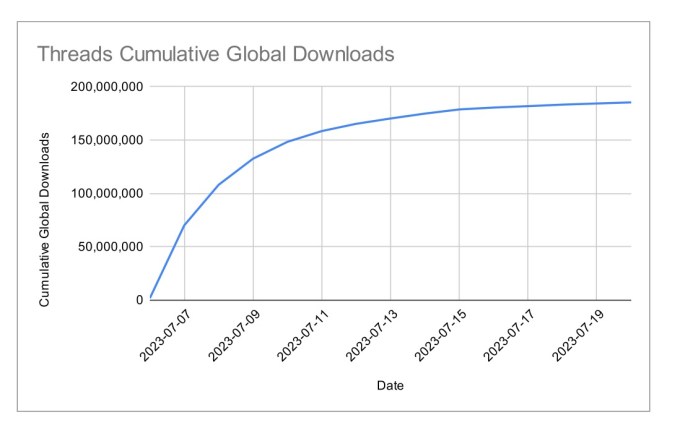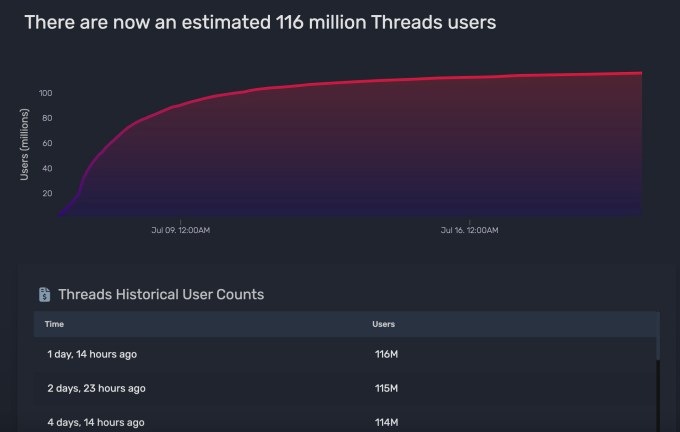
A Wall Street Journal article on Friday warns that Instagram’s new Twitter competitor Threads is already losing steam. Citing third-party data from Sensor Tower, the paper reports the number of daily active users on Threads dropped for the second week down to 13 million, a 70% decline from a July 7 high point. By comparison, Twitter’s daily active users are around 200 million. Despite this seemingly worrying trend, it’s far too soon to count Threads out yet. By other metrics, the app is continuing to grow its user base and traction in global markets, which, in time, could also boost its usage — especially as the app’s feature set improves.
It’s expected that a highly-anticipated new app would have stellar usage numbers in its early days as users set up their accounts, find and follow friends, and test out the app’s capabilities. As the newness wears off, it’s also typical to see usage numbers drop as users return to their old habits while determining if and how they’ll continue to fit the new app into their daily routines. Plus, The WSJ points out, Meta executives said they planned for an eventual decline and don’t see this usage drop as worrisome.
We don’t either. Threads is still too new and too incomplete to make any sort of determination yet on its eventual fate. Could it be an early record-breaker that eventually flops? Sure. But it could also be a legitimate Twitter killer or mid-level success. It’s just too early to tell.
Launched on July 5 to global markets, excluding the EU, Threads topped 100 million users within days of its arrival — becoming the fastest app to achieve that milestone, ahead of Pokémon Go, according to app intelligence firm data.ai. During its first three days, it had 18.3% of the daily active users of Twitter, or 54.4 million to Twitter’s 298 million. By last week, data.ai estimated the app still had roughly one-fifth of the weekly active user base of Twitter.

Image Credits: data.ai
App installs for Threads peaked on July 9, a few days after its launch, when 24.5 million people downloaded the app globally across iOS and Android, data.ai says. But though the initial buzz may be wearing off, the app has continued to clock in north of 1 million new downloads daily over the past several days, ranging from 1.76 million on July 16 to 1.06 million on July 20, for example. Any new app on the market would be thrilled to see numbers like these, though perhaps Threads should be judged more harshly because it has the advantage of the network effects delivered by the nature of its parent app Instagram and the broader resources of Meta.
Data.ai estimates the app has now seen 185.32 million cumulative global downloads.

Image Credits: data.ai

Image Credits: data.ai
Another key point to note is that Threads is catching on in emerging mobile markets where downloads are still growing. The U.S. is only its third-largest market, data.ai’s analysis shows. As of July 17, India and Brazil accounted for a larger number of installs, at 60.1 million (32.6%) and 40.2 million (21.8%), respectively. The U.S. delivered 27.8 million downloads or 15.1%. That’s why analytics firm Similarweb’s analysis of U.S. Android usage declines — 21 minutes on July 7 to 6 minutes on July 14 — aren’t able to tell the whole story.
Though Threads usage may have declined for now, as Sensor Tower data shows, its early usage numbers demonstrated its potential as a Twitter rival. In its first few days on the market, Threads users were spending 15 minutes on average per day on the app, across 9.4 app sessions. That’s more than the “microblogging” category averages, which data.ai says includes Twitter, Truth Social, Mastodon and Bluesky. Microblogging users then spent 12.5 minutes per day, on average, across 7.8 app sessions.
What’s stopping people from using Threads more as of late may not be disappointment with the concept of the app itself but rather its current feature set, as compared with Twitter. Threads, though now publicly available, is effectively still a beta — an unfinished app — without a number of the features users want in a microblogging tool, like a chronological timeline, following feed, the ability to view your likes, a fully functional web version, an edit button, support for multiple accounts, and more. These features are still in the works, along with Threads’ planned integration with ActivityPub, the protocol powering open source Twitter alternative Mastodon.
In one thread on Threads (ha), in fact, users rushed to defend the app against the narrative that the app was dead, remarking that people should be more patient and wait for the needed features, and reminding others that even Instagram wasn’t an overnight success.
Another post, led by social media consultant Matt Navarra, asked “threads is…” To this, Instagram head Adam Mosseri replied “a work in progress.” Across hundreds of other replies, many posted positive messages, calling the app an “opportunity,” better than Twitter, an “inspiration,” “exciting” and more — an indication that Threads is already building a community of fans.
Another indication is the app’s U.S. App Store rating, a 3.8-star rating across 20K reviews. Diving into where it’s losing points, it seems many of those downrating the app are doing so due to its incomplete nature, calling it a “promising start” but removing stars for its lack of certain features. By comparison, Instagram has a 4.7-star rating and Facebook has a 2.3. Another thing Threads has in its favor, based on these reviews and other online conversations, is that the app, for now, feels “less toxic” than Twitter, several users have remarked.
While Twitter users are already dancing on Threads’ grave, thanks to The WSJ report, the reality is that it’s too early to report on Threads’ week two usage declines and come to the conclusion that Threads is dying. An app that breaks records out of the gate and continues to add users still has plenty of runway ahead and has time to deliver on the features people want, in order to regain traction.
Even seven-year-old Mastodon, the decentralized social networking Twitter rival, is continuing to grow in the wake of Elon Musk’s missteps with Twitter. After Twitter’s acquisition, Mastodon peaked at 2.5 million monthly active users. When Threads, launched, Mastodon had fallen to 1.7 million monthly users. It has since begun to grow again, now seeing 2.1 million monthly active users. These things ebb and flow.
There’s also an online culture that’s more willing to experiment with new apps — whether that’s Twitter alternatives like Threads and Bluesky, Reddit alternatives like Lemmy and Kbin, or new ways to network like TikTok instead of old-fashioned Facebook.
Plus, for Threads to succeed, Twitter doesn’t have to completely fail. Users can pick and choose between them or they can use both. It’s not necessarily a zero-sum game.
That said, Meta doesn’t have a great track record for launching successful new apps having shuttered nearly everything it built (instead of simply acquiring) over the years. Threads could one day become another app added to its graveyard.
But in the meantime, an app with now an estimated 116 million users and growing is far from being “dead.”

Image Credits: Quiver Quant